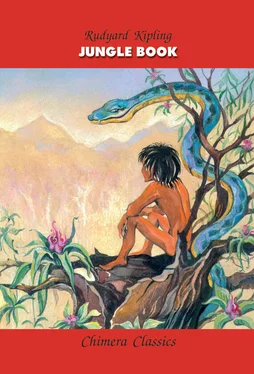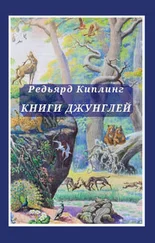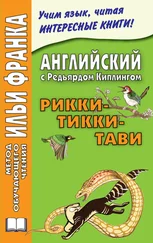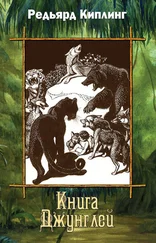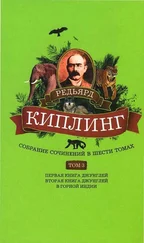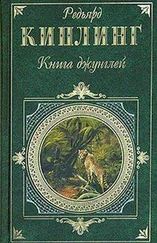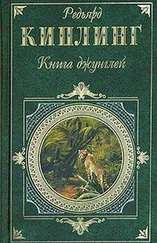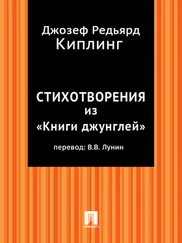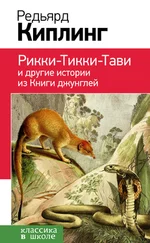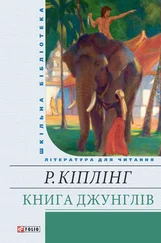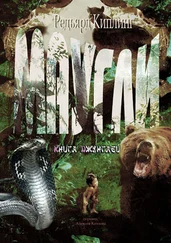Редьярд Киплинг - Jungle Book / Книга джунглей
Здесь есть возможность читать онлайн «Редьярд Киплинг - Jungle Book / Книга джунглей» — ознакомительный отрывок электронной книги совершенно бесплатно, а после прочтения отрывка купить полную версию. В некоторых случаях можно слушать аудио, скачать через торрент в формате fb2 и присутствует краткое содержание. Город: Санкт-Петербург, Год выпуска: 2003, ISBN: 2003, Издательство: Array Литагент «Антология», Жанр: foreign_prose, на английском языке. Описание произведения, (предисловие) а так же отзывы посетителей доступны на портале библиотеки ЛибКат.
- Название:Jungle Book / Книга джунглей
- Автор:
- Издательство:Array Литагент «Антология»
- Жанр:
- Год:2003
- Город:Санкт-Петербург
- ISBN:5-94962-016-X
- Рейтинг книги:3 / 5. Голосов: 1
-
Избранное:Добавить в избранное
- Отзывы:
-
Ваша оценка:
- 60
- 1
- 2
- 3
- 4
- 5
Jungle Book / Книга джунглей: краткое содержание, описание и аннотация
Предлагаем к чтению аннотацию, описание, краткое содержание или предисловие (зависит от того, что написал сам автор книги «Jungle Book / Книга джунглей»). Если вы не нашли необходимую информацию о книге — напишите в комментариях, мы постараемся отыскать её.
Jungle Book / Книга джунглей — читать онлайн ознакомительный отрывок
Ниже представлен текст книги, разбитый по страницам. Система сохранения места последней прочитанной страницы, позволяет с удобством читать онлайн бесплатно книгу «Jungle Book / Книга джунглей», без необходимости каждый раз заново искать на чём Вы остановились. Поставьте закладку, и сможете в любой момент перейти на страницу, на которой закончили чтение.
Интервал:
Закладка:
«Oho!» said Petersen Sahib, smiling underneath his mustache, «and why didst thou teach thy elephant that trick? Was it to help thee steal green corn from the roofs of the houses when the ears are put out to dry?»
«Not green corn, Protector of the Poor, – melons», said Little Toomai, and all the men sitting about broke into a roar of laughter. Most of them had taught their elephants that trick when they were boys.
Little Toomai was hanging eight feet up in the air, and he wished very much that he were eight feet underground.
«He is Toomai, my son, Sahib», said Big Toomai, scowling. «He is a very bad boy, and he will end in a jail, Sahib».
«Of that I have my doubts», said Petersen Sahib. «A boy who can face a full Keddah at his age does not end in jails. See, little one, here are four annas to spend in sweetmeats because thou hast a little head under that great thatch of hair. In time thou mayest become a hunter too». Big Toomai scowled more than ever. «Remember, though, that Keddahs are not good for children to play in», Petersen Sahib went on.
«Must I never go there, Sahib?» asked Little Toomai with a big gasp.
«Yes». Petersen Sahib smiled again. «When thou hast seen the elephants dance. That is the proper time. Come to me when thou hast seen the elephants dance, and then I will let thee go into all the Keddahs».
There was another roar of laughter, for that is an old joke among elephant-catchers, and it means just never.
There are great cleared flat places hidden away in the forests that are called elephants’ ball-rooms, but even these are only found by accident, and no man has ever seen the elephants dance. When a driver boasts of his skill and bravery the other drivers say, «And when didst thou see the elephants dance?»
Kala Nag put Little Toomai down, and he bowed to the earth again and went away with his father, and gave the silver four-anna piece to his mother, who was nursing his baby brother, and they all were put up on Kala Nag’s back, and the line of grunting, squealing elephants rolled down the hill path to the plains. It was a very lively march on account of the new elephants, who gave trouble at every ford, and needed coaxing or beating every other minute.
Big Toomai prodded Kala Nag spitefully, for he was very angry, but Little Toomai was too happy to speak. Petersen Sahib had noticed him, and given him money, so he felt as a private soldier would feel if he had been called out of the ranks and praised by his commander-in-chief.
«What did Petersen Sahib mean by the elephant dance?» he said, at last, softly to his mother.
Big Toomai heard him and grunted. «That thou shouldst never be one of these hill buffaloes of trackers. That was what he meant. Oh, you in front, what is blocking the way?»
An Assamese driver, two or three elephants ahead, turned round angrily, crying: «Bring up Kala Nag, and knock this youngster of mine into good behavior. Why should Petersen Sahib have chosen me to go down with you donkeys of the rice fields? Lay your beast alongside, Toomai, and let him prod with his tusks. By all the Gods of the Hills, these new elephants are possessed, or else they can smell their companions in the jungle». Kala Nag hit the new elephant in the ribs and knocked the wind out of him, as Big Toomai said, «We have swept the hills of wild elephants at the last catch. It is only your carelessness in driving. Must I keep order along the whole line?»
«Hear him!» said the other driver. «We have swept the hills! Ho! Ho! You are very wise, you plains people. Anyone but a mud-head who never saw the jungle would know that they know that the drives are ended for the season. Therefore all the wild elephants to-night will – but why should I waste wisdom on a river-turtle?»
«What will they do?» Little Toomai called out.
«Ohe, little one. Art thou there? Well, I will tell thee, for thou hast a cool head. They will dance, and it behooves thy father, who has swept all the hills of all the elephants, to double-chain his pickets to-night».
«What talk is this?» said Big Toomai. «For forty years, father and son, we have tended elephants, and we have never heard such moonshine about dances».
«Yes; but a plainsman who lives in a hut knows only the four walls of his hut. Well, leave thy elephants unshackled tonight and see what comes. As for their dancing, I have seen the place where – Bapree-bap! How many windings has the Dihang River? Here is another ford, and we must swim the calves. Stop still, you behind there».
And in this way, talking and wrangling and splashing through the rivers, they made their first march to a sort of receiving camp for the new elephants. But they lost their tempers long before they got there.
Then the elephants were chained by their hind legs to their big stumps of pickets, and extra ropes were fitted to the new elephants, and the fodder was piled before them, and the hill drivers went back to Petersen Sahib through the afternoon light, telling the plains drivers to be extra careful that night, and laughing when the plains drivers asked the reason.
Little Toomai attended to Kala Nag’s supper, and as evening fell, wandered through the camp, unspeakably happy, in search of a tom-tom. When an Indian child’s heart is full, he does not run about and make a noise in an irregular fashion. He sits down to a sort of revel all by himself. And Little Toomai had been spoken to by Petersen Sahib! If he had not found what he wanted, I believe he would have been ill.
But the sweetmeat seller in the camp lent him a little tom-tom – a drum beaten with the flat of the hand – and he sat down, cross-legged, before Kala Nag as the stars began to come out, the tom-tom in his lap, and he thumped and he thumped and he thumped, and the more he thought of the great honor that had been done to him, the more he thumped, all alone among the elephant fodder. There was no tune and no words, but the thumping made him happy.
The new elephants strained at their ropes, and squealed and trumpeted from time to time, and he could hear his mother in the camp hut putting his small brother to sleep with an old, old song about the great God Shiva, who once told all the animals what they should eat. It is a very soothing lullaby, and the first verse says:
Shiva, who poured the harvest and made the winds to blow,
Sitting at the doorways of a day of long ago,
Gave to each his portion, food and toil and fate,
From the King upon the guddee to the Beggar at the gate.
All things made he – Shiva the Preserver.
Mahadeo! Mahadeo! He made all —
Thorn for the camel, fodder for the kine,
And mother’s heart for sleepy head, O little son of mine!
Little Toomai came in with a joyous tunk-a-tunk at the end of each verse, till he felt sleepy and stretched himself on the fodder at Kala Nag’s side. At last the elephants began to lie down one after another as is their custom, till only Kala Nag at the right of the line was left standing up; and he rocked slowly from side to side, his ears put forward to listen to the night wind as it blew very slowly across the hills. The air was full of all the night noises that, taken together, make one big silence – the click of one bamboo stem against the other, the rustle of something alive in the undergrowth, the scratch and squawk of a half-waked bird (birds are awake in the night much more often than we imagine), and the fall of water ever so far away. Little Toomai slept for some time, and when he waked it was brilliant moonlight, and Kala Nag was still standing up with his ears cocked. Little Toomai turned, rustling in the fodder, and watched the curve of his big back against half the stars in heaven, and while he watched he heard, so far away that it sounded no more than a pinhole of noise pricked through the stillness, the «hoot-toot» of a wild elephant.
Читать дальшеИнтервал:
Закладка:
Похожие книги на «Jungle Book / Книга джунглей»
Представляем Вашему вниманию похожие книги на «Jungle Book / Книга джунглей» списком для выбора. Мы отобрали схожую по названию и смыслу литературу в надежде предоставить читателям больше вариантов отыскать новые, интересные, ещё непрочитанные произведения.
Обсуждение, отзывы о книге «Jungle Book / Книга джунглей» и просто собственные мнения читателей. Оставьте ваши комментарии, напишите, что Вы думаете о произведении, его смысле или главных героях. Укажите что конкретно понравилось, а что нет, и почему Вы так считаете.
